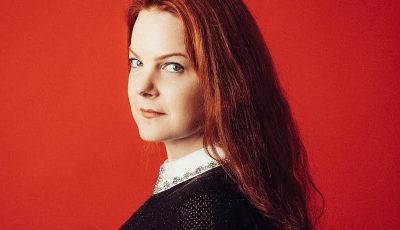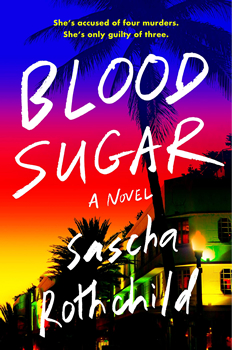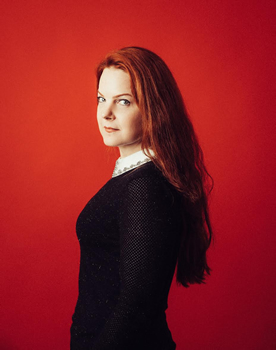

BookTrib Spotlight: Sascha Rothchild
Don’t Call Her a Sociopath
One murder every ten years seemed extremely reasonable. We all encounter bad people all the time. Backstabbing coworkers. Assholes who litter. Fathers who hit. Mothers who neglect. People who run puppy mills. And on and on. But I was not in the business of killing off every jerk who crossed my path. I was not a homicidal slut.
The speaker in Sascha Rothchild’s BLOOD SUGAR is Ruby Simon, and she wants you to know she is not a sociopath. The three people she’s killed all deserved it. The first was the school bully who mercilessly bullied Ruby’s sister. When Ruby was five, she drowned him in the ocean: “He was evil and had to go. I saw an opportunity and I took it. So that day on the beach, murder became another skill added to my toolbox. And once I saw how effective a tool it was, I kept it handy.”
The second was a friend’s drunken father who attacked the 16-year-old Ruby in the kitchen while her friends were upstairs at a slumber party. The third was a court-mandated patient—Ruby was a mental health professional by that time—of such surpassing obnoxiousness that Ruby figured she had to at least try to remove her rotten soul from this planet.
But that was it, just those three, which is why it’s so exasperating that a Miami police detective is trying to lock her away for a death she had nothing to do with. All right, yes, it’s her husband, but he was a diabetic, and he died in his sleep, and she really doesn’t think they can pin it on her, but if they decide to go digging around in her past…that could not be good. They might unearth all her elephants and make them public, parade them down the street.
Seated in the interrogation room now, her life passes before her eyes—and ours—and it is a very singular life indeed, crowded with events, filled with surprising turns, and told by a woman with an indelible mix of wit, candor, and knife-sharp observation. Not that she’d ever use a knife.
What happens next? You’ll have to find out for yourself. But life has a way of working things out on its own sometimes, don’t you find?
Sascha Rothchild got the idea for the book because she couldn’t sleep. “My husband is a type one diabetic, which means he can die in the middle of the night of a low blood sugar. It’s a real thing—it’s so common it has a name: dead in bed. So one night I’m awake, can’t sleep, he is sound asleep, of course, and I start wondering… If he died, and I frantically called 911, would police arrive and think I killed him? This might seem like a weird leap, but my mind always wanders when I can’t sleep, and I imagine what if this or what if that. I am also a big fan of true crime, and I know the spouse is often the first suspect. Then I started thinking about my day, my week, my movements. Would meaningless things like the fact that I texted our dog walker 20 times that day add up to motive like an affair? And then I thought, wait, what if I actually HAD killed other people before, in my past, and gotten away with it? But now I’m being investigated by the police, for my husband’s murder, no stone left unturned! And in that moment, in my bed at three a.m., the plot for my novel BLOOD SUGAR was born. My husband is totally fine, by the way.”
The character of Ruby came from many places: “I am very exacting and organized, and use one pen until that pen runs out, so in this way, Ruby is a kindred spirit. I also grew up in Miami Beach, and the specifics of my childhood helped me to place Ruby and then imagine her moving through the world in her own way. I took parts of my personality, then exaggerated them and twisted them and turned them inside out to create an original character whom I could admire and love and be a little afraid of, but who is not me. My skin is actually very irritated by the sun, so I am never at the beach or in the ocean. I made Ruby a beach lover immediately and put her in the ocean to separate myself from her as I explored her journey.
“As a child, I loved Harriet the Spy. I knew it was supposed to be a cautionary tale, but I was inspired to eavesdrop and absorb information around me, especially information I was not supposed to have. (Another similarity between me and Ruby!) When I read Crime and Punishment, I was fascinated by the idea that the antagonist feeling guilty was what saved his humanity in the end. I wondered what might happen if he never felt guilty at all. That idea stayed with me and helped me create BLOOD SUGAR. When I read Circe, Madeline Miller’s brilliant take on a misunderstood lesser goddess, I was inspired to keep writing my own difficult anti-heroine. Middlemarch is one of my favorite novels because of the minutiae. I kept that in mind as I delved into Ruby’s detailed observations.
“I also spoke to many of my lawyer friends about the ins and outs of indictments and arrests. When I called them, they all said, ‘Please tell me this is for something you are writing! And you don’t need an attorney.’ After speaking with them, I was very surprised to learn about grand juries and how one-sided they are. As for Ruby’s profession, I have been in therapy for half my life, so being on that side of the couch helped me delve into the therapy sessions, and I interviewed a few psychologists to ask about schooling, techniques, rules and regulations.”
She was also influenced by her day job—Rothchild is an Emmy-nominated screenwriter who has written and produced such notable television shows as GLOW, The Bold Type, The Baby-Sitters Club, and The Carrie Diaries.
“When writing for TV, every moment costs money. So scenes need to be crisply poignant or dramatic or emotional or comedic and have a very clear purpose to move the plot along or the character development along. There is no time to meander. When writing this novel, I approached it as a TV writer. Each chapter as if it was a scene, which is why they are short. And the twists and turns and reveals as cliffhangers, almost as if they are ends of an episode and the reader can then decide to place the book down until they want to pick it up again, or binge it all in one weekend. I also made sure no detail is superfluous, and everything mentioned comes back in a meaningful way. So no ‘real estate,’ as we say with script page counting, is wasted.
“Once I have an idea, I think about how to turn it on its head. How to make it not exactly what might be expected. Then I think about a beginning of the story and the end of the story. And the main characters. And I start writing. The details start to form as I type, and I make notes as I go along, so my details are consistent and important. I write very quickly, and it’s sloppy. I am a writer who does many, many, many drafts, each one becoming more polished and precise. I write pages and pages and don’t read them over at all until I have a finished draft. Then I start again from page one to rewrite. And again from page one to rewrite after that. I like to get a thing finished, so it exists in my computer. Then carving it and carving it until it is in the shape I want. I have a very strict writing schedule. I sit and I type or I sit and I stare at the screen. Seven hours a day, five days a week.
“My first job writing for television was on the series The Carrie Diaries. I wrote a scene in an episode and described ‘Carrie walks down the street on a cold and windy day, clutching her coat tighter.’ I was later told I had to have a meeting with the line producer, the person who controls the budget. She explained to me that to create wind for this scene would add time and money, and we would need to bring in special wind machines. She asked me if it would be okay to just have it be a cold day, and have the actress clutch her coat tighter? I was amazed. Of course we don’t need wind! I just wrote the word to set the vibe of the scene, not at all thinking about what it would take to literally create wind. It was my first experience feeling the magic of words on pages truly coming to life. And to make clear decisions about what is important for the story-telling and what can be left out.”
That kind of decision-making has led her to an ever-escalating succession of titles in television: “There is a hierarchy when it comes to television writers. As you work your way up and gain more experience, you start getting producer titles. Because as well as contributing in the writers room and writing episodes, you begin to make producer-type decisions about things like locations and props and casting. A consulting producer is a title given if the writer has a lot of experience, but perhaps not on a TV series. Or if a writer has a ton of experience and is only working a bit consulting on a show. A supervising producer is a mid-level producer within the writers room. An executive producer is the highest level on a show, other than the showrunner. And can be counted on to run the set and rewrite scripts. I have had all of those titles, and they tell the story of me working my way up on various shows. I am now a showrunner on a new Netflix series, which is a huge honor.”
Getting a novel published, however, was the usual up-and-down experience, or in this case, down-and-up: “Five years ago, I was in between television jobs. The idea for this novel had been banging around in my head, and since I was not working on a series, I had the time to sit down and write it. I made a play list of moody instrumental music and started. It took me four months to complete a first draft. I then got an exciting television job, and the manuscript sat in my laptop for a while. Once I had time to rewrite it, I sent a draft to my then-book agent. She passed. I was disheartened, and the manuscript sat for another year in my laptop. I then signed with a new manager, who believed in me wholeheartedly and helped me get the manuscript to a new book agent. She connected to the material immediately, and things moved fast. My agent sent it out to publishers, and within a week I signed a deal with Putnam. My editor there truly brought out the best in me and this material, and we’re now discussing a second novel. I have my idea, and my start and my end.”
Asked for any final words, she has this to say: “I have always been an avid reader, discussing books with my family and my friends, and I was in a book club for years. The books we did not all agree on made for the most compelling conversations. I hope BLOOD SUGAR is debated. Perhaps not liked by all readers, but if I can start some conversations and get readers riled up, either because they loved it or hated it, I will feel I’ve accomplished something special.”
She already has.
*****
Neil Nyren retired at the end of 2017 as the executive VP, associate publisher, and editor in chief of G. P. Putnam’s Sons. He is the winner of the 2017 Ellery Queen Award from the Mystery Writers of America. Among his authors of crime and suspense were Clive Cussler, Ken Follett, C. J. Box, John Sandford, Robert Crais, Jack Higgins, W. E. B. Griffin, Frederick Forsyth, Randy Wayne White, Alex Berenson, Ace Atkins, and Carol O’Connell. He also worked with such writers as Tom Clancy, Patricia Cornwell, Daniel Silva, Martha Grimes, Ed McBain, Carl Hiaasen, and Jonathan Kellerman.
He is currently writing a monthly publishing column for the MWA newsletter The Third Degree, as well as a regular ITW-sponsored series on debut thriller authors for BookTrib.com and is an editor at large for CrimeReads.
This column originally ran on Booktrib, where writers and readers meet.
- Africa Scene: Iris Mwanza by Michael Sears - December 16, 2024
- Late Checkout by Alan Orloff (VIDEO) - December 11, 2024
- Jack Stewart with Millie Naylor Hast (VIDEO) - December 11, 2024



